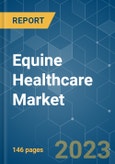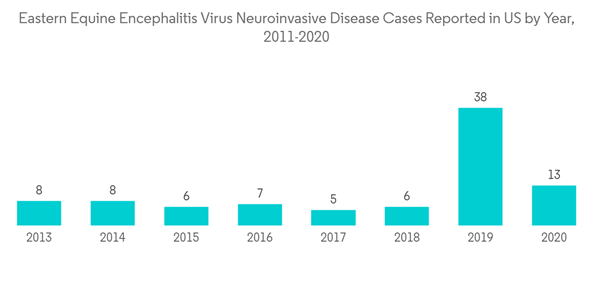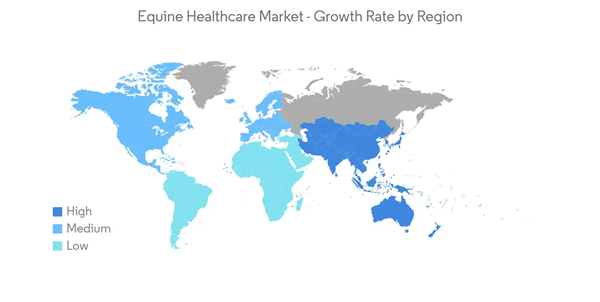The COVID-19 pandemic had a significant impact on the equine healthcare market initially due to strict social distancing guidelines imposed by many countries, which led to a shutdown of teaching, training, competitions, events, touristic activities, renting of infrastructures, trade, and sales of horses. For instance, according to a representative of the United States Equestrian Federation (USEF), the national governing body for horse sports in the United States, about 30% of all events originally scheduled on their 2020 show calendar was canceled. This severely impacted the revenue generation of the equine industry. In addition, this has also been anticipated to result in collateral consequences for the health and welfare of horses and ponies. However, with the countries being reopened again, the equine industry is also on track for a rebound. In addition, there were new product developments for the animal vaccine against COVID-19. For instance, in June 2022, the Ministry of Agriculture & Farmers Welfare (India) launched the Ancovax vaccine, an inactivated SARS-CoV-2 Delta (COVID-19) vaccine for animals, including equines. The vaccine was developed by the Indian Council of Agriculture Research (ICAR)-National Research Centre on Equines. Thus, the COVID-19 outbreak affected the market's growth adversely in its preliminary phase; however, the market gained traction with the opening of the countries and new product launches globally.
Further, the rising animal health spending, increasing prevalence of equine diseases, and increasing uptake of animal insurance are among the major factors driving the growth of the market studied. For instance, in December 2021, the Asian Development Bank (ADB) signed an agreement with Zenex Animal Health India Private Limited to invest up to USD 10 million to increase Zenex’s production and distribution of quality animal health care products and help boost farmer incomes by mitigating livestock disease risk. Such factors will likely boost the demand for equine healthcare, thereby contributing to the growth of the market studied.
The equine industry involves business, working animals, sports, and recreation, among others. There are a large number of horse races, shows, competitions, and recreational activities involving horses globally. Domestic and foreign horses are exported and imported permanently and temporarily to and from countries globally. As horses are prone to an array of equine diseases, equine healthcare products are in increasing demand. In addition, the risk and threat of spreading zoonotic diseases from horses are also driving the demand for equine healthcare products. For instance, according to a systemic review published in Vector Borne Zoonotic Dis. 2020, about 56 zoonotic pathogens have been identified in horses. Moreover, during the second quarter of 2022, the International Collating Centre reported 191 disease outbreaks from 13 countries. The reports covered 18 diseases/infections, of which strangles (n=77) was the most prevalent, followed by neurological EHV-1 (n=19). Thus, the high risk of the spread of a contagious equine disease is driving the equine market studied.
Thus, the rising animal health spending, increasing prevalence of equine diseases, and the increasing uptake of animal insurance are poised to accelerate the Equine Healthcare market globally, thereby driving the growth of the studied market over the forecast period. However, a shortage of skilled veterinarians will likely impede market growth.
Equine Healthcare Market Trends
Vaccines Segment is Expected to Witness Growth Over the Forecast Period
A vaccine is a biological preparation used to develop and maintain individual and herd immunity against infectious diseases. The basic or core equine vaccines are those vaccines that protect against diseases that have significant health risks to the horse and/or to humans through contact. Commercial vaccines are available for rabies, tetanus, influenza, equine herpesviruses 1 and 4, botulism, Potomac horse fever, equine viral arteritis, rotavirus, West Nile virus, and Streptococcus equi (strangles), among others. According to the American Veterinary Medical Association (AVMA), certain equine vaccines, including eastern & western equine encephalomyelitis, rabies, tetanus, and West Nile virus, meet the criteria for core vaccines and are identified as one.Moreover, new product launches and strategic activities by major players in the market are positively affecting the growth of the market studied. For instance, in February 2022, Zoetis launched the Horse First Health Care portfolio, strengthening its core strategic focus in equine healthcare. In addition, in recent years, several advancements in vaccine technology are further driving the market growth. Recent advances in recombinant proteins-based vaccines have led to the development of newer vaccines. For instance, in August 2022, Dechra Pharmaceuticals PLC launched Strangvac, a new protein-based strangles vaccine for horses and ponies. Thus, owing to the product launches and strategic activities by major players, the market studied is expected to have significant growth over the forecast period.
Therefore, the vaccines segment is expected to witness significant growth over the forecast period due to the abovementioned factors.
North America is Expected to Dominate the Equine Healthcare Market
North America is expected to dominate the market owing to factors such as the high equine population, high animal health spending, and increasing number of equine vaccination programs in the region. In addition, the availability of skilled veterinarians in the United States is also among the key factors contributing to the growth of the market studied in North America.Several partnerships and collaborations, a high concentration of market players, and the manufacturer's presence in the United States are some of the factors driving the growth of the Equine Healthcare market in the country. For instance, in September 2021, Merck & Co., Inc. entered a partnership with Irish-based technology company EquiTrace Ltd, creators of the EquiTrace platform. The app also works with Merck Animal Health’s Bio-Thermo microchips, allowing horse care professionals to instantly read, graph, and monitor a horse’s temperature. Likewise, In December 2021, Hygain, an equine nutrition solution brand, acquired Arenus Animal Health (Arenus). This is anticipated to strengthen its product portfolio significantly.
Increasing support from the government to regulate and protect equine healthcare is also anticipated to drive the market. For instance, the National Equine Health Plan (NEHP) provided by the United States Department of Agriculture (USDA) and the American Horse Council (AHC) protects the health and welfare of the United States equine population and facilitates the continued interstate and international movement of equines and their products. In another instance, in August 2022, the Horses and Humans Research Foundation (HHRF) and Zoetis announced a partnership as a continued sponsor. The partnership included support for HHRF’s 2022 Conference held in August in the United States. These continuous regional developments are anticipated to drive market growth in the country.
Therefore, owing to the aforementioned factors, the market's growth is anticipated in the North America Region.
Equine Healthcare Market Competitor Analysis
The Equine Healthcare market is slightly consolidated due to the presence of a few big companies operating globally and regionally. The competitive landscape includes an analysis of a few international as well as local companies which hold significant market shares and are well known, including Zoetis, Boehringer Ingelheim International GmbH, Ceva, Merck & Co., Inc., Hallmarq Veterinary Imaging, Vetoquinol S.A., ESAOTE SPA, IDEXX Laboratories, Inc., Dechra Pharmaceuticals PLC, Elanco, among others.Additional benefits of purchasing the report:
- The market estimate (ME) sheet in Excel format
- 3 months of analyst support
This product will be delivered within 2 business days.
Table of Contents
Companies Mentioned (Partial List)
A selection of companies mentioned in this report includes, but is not limited to:
- Zoetis
- Boehringer Ingelheim International GmbH
- Ceva
- Merck & Co., Inc.
- Vetoquinol S.A.
- Hallmarq Veterinary Imaging
- ESAOTE SPA
- IDEXX Laboratories, Inc.
- Dechra Pharmaceuticals PLC
- Elanco










